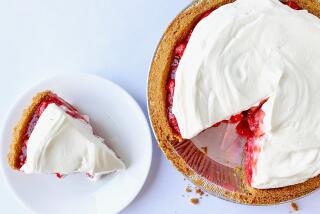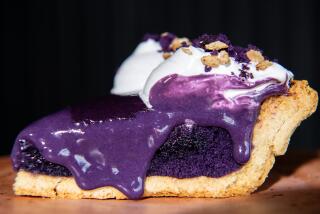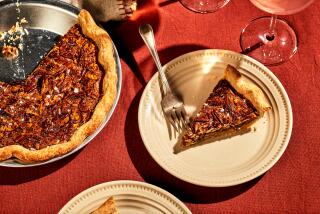Pie Crust II: Roll It
- Share via
Pie crust dough is made by cutting shortening into lightly salted flour, adding water and forming the dough into a ball. (See Back to Basics, Aug. 17.) It can then be be rolled out immediately or chilled up to two days before rolling.
Some cooks claim that even half an hour’s chilling tenderizes the dough, making it easier to handle, and helps minimize shrinkage during baking; others believe the chilling makes little difference. In any case, dough that has been chilled for an extended period should be removed from the refrigerator about an hour before being shaped so that it reaches room temperature.
We recommend putting the dough on a smooth surface covered with pastry cloth and rolling it out with a revolving pin in a stockinette (or stocking) cover. However, other types of rolling pins and plain surfaces, like a board, marble slab or Formica countertop may be used. Working quickly in a cool area will aid in keeping the pastry dough tender and flaky.
Flour both the work surface and the rolling pin, rubbing flour well into both. Use enough to keep the pastry from sticking, but be careful not to apply so much that it gets incorporated into the dough, or the pastry will become tough.
Try to keep the pastry round, without any ragged edges. Repair breaks in the edge by pressing the dough together with your fingertips. Lift and rotate the dough periodically to keep it from sticking to the surface.
The goal is to roll the pastry into a circle about 1/8 inch thick and 2 inches larger in diameter than the inverted pie plate it will fill. One sign that the dough has been rolled thin enough is that only a slight imprint will remain when it’s touched lightly with a finger.
While gently easing the rolled pastry into the pie pan, be careful not to stretch the dough, it will shrink during baking.
Once the pastry is in the pie plate, press it all over with your fingers to remove air pockets. Any tears in the trimmed edge may be repaired by pressing the dough together with your fingertips or patching with trimmings.
1. Flatten the dough ball into a round, thick disk without cracks in the sides.
2. Lightly roll the dough from the center out in all directions, with short, smooth strokes.
3. To transfer the dough into a pie plate, lightly roll it around the rolling pin, then unroll over the plate.
4. Trim the pastry hanging over the edge of the pie plate with scissors or a sharp knife, leaving about an inch to fold under and flute.
More to Read
Eat your way across L.A.
Get our weekly Tasting Notes newsletter for reviews, news and more.
You may occasionally receive promotional content from the Los Angeles Times.










